한국응용과학기술학회 논문 검색
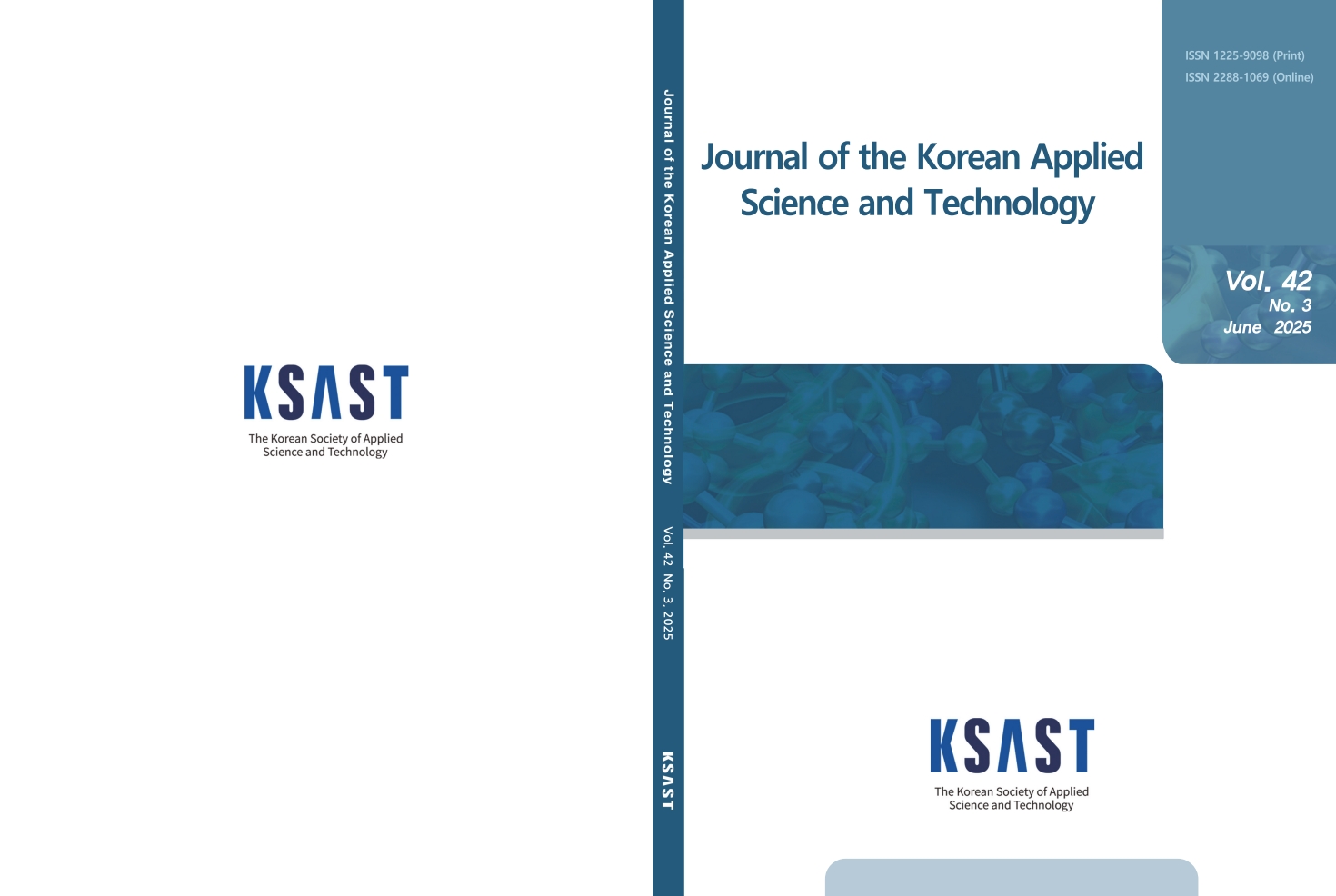
Improving Acceptability of Goji Berry Functional Beverages through Multi-Ingredient Formulation: A Statistical Sensory Approach
간행물 정보 : Vol. 42 No. 3, 2025년,
파일형식 : pdf

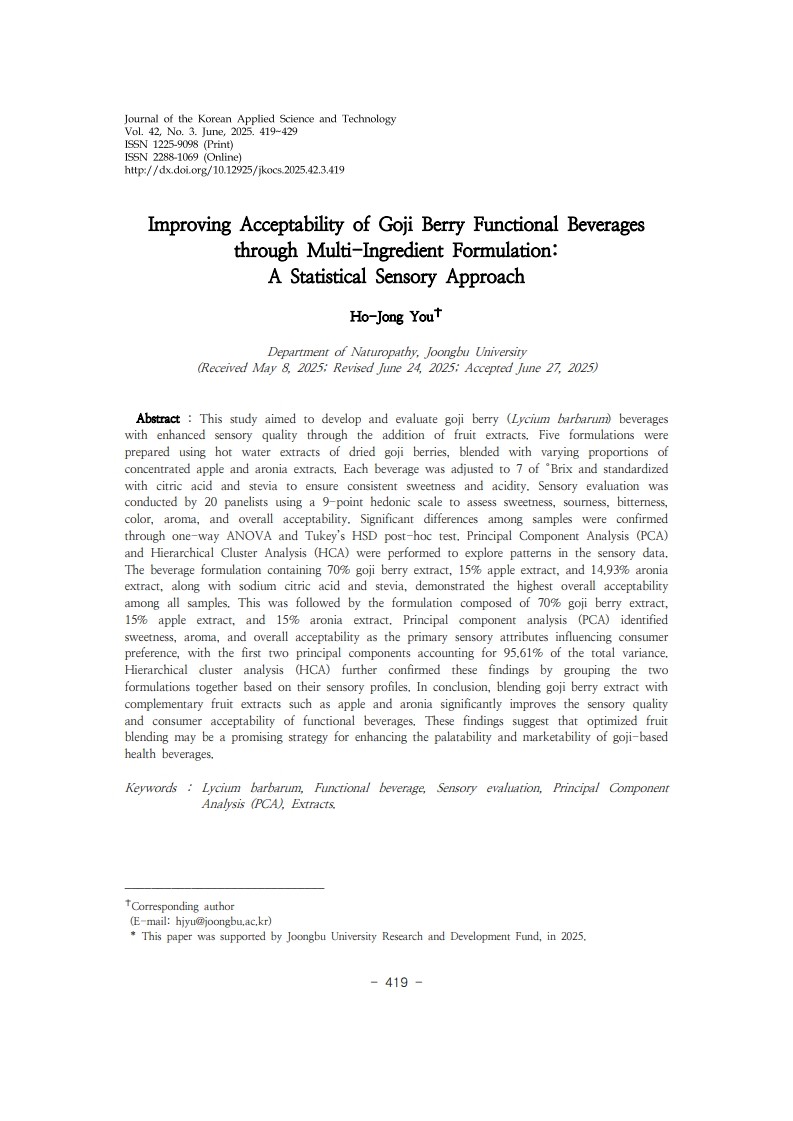
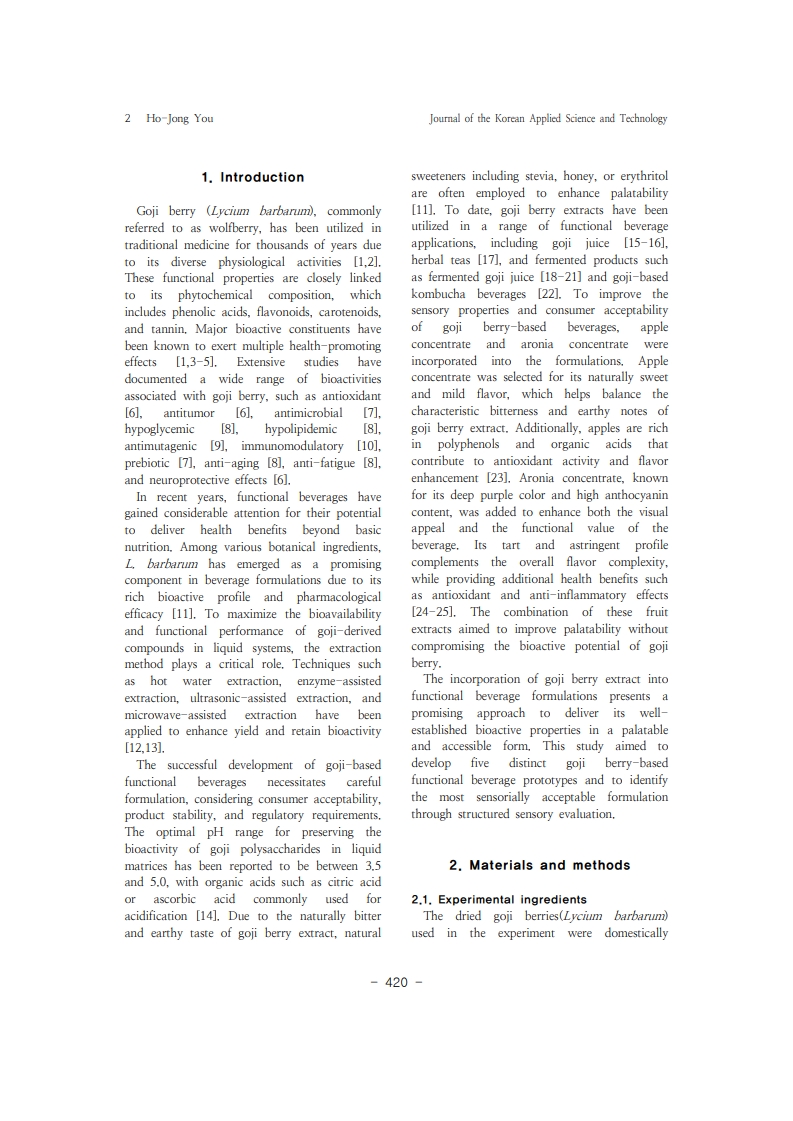
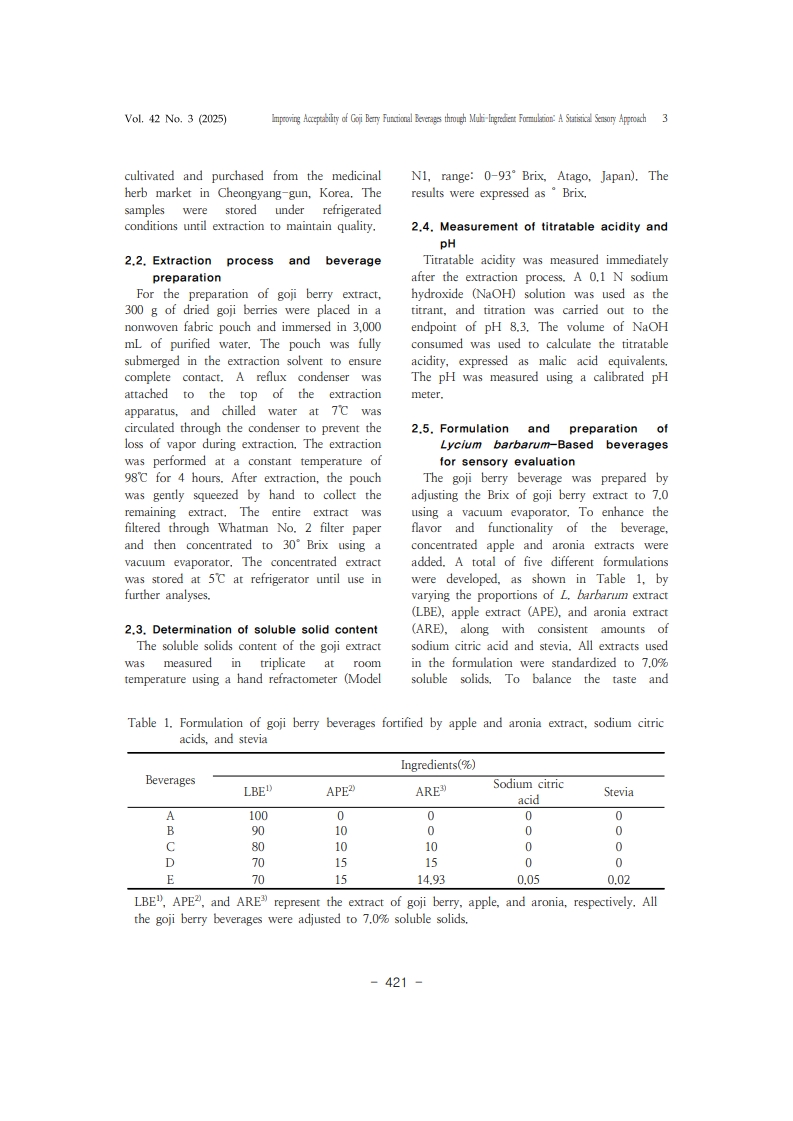
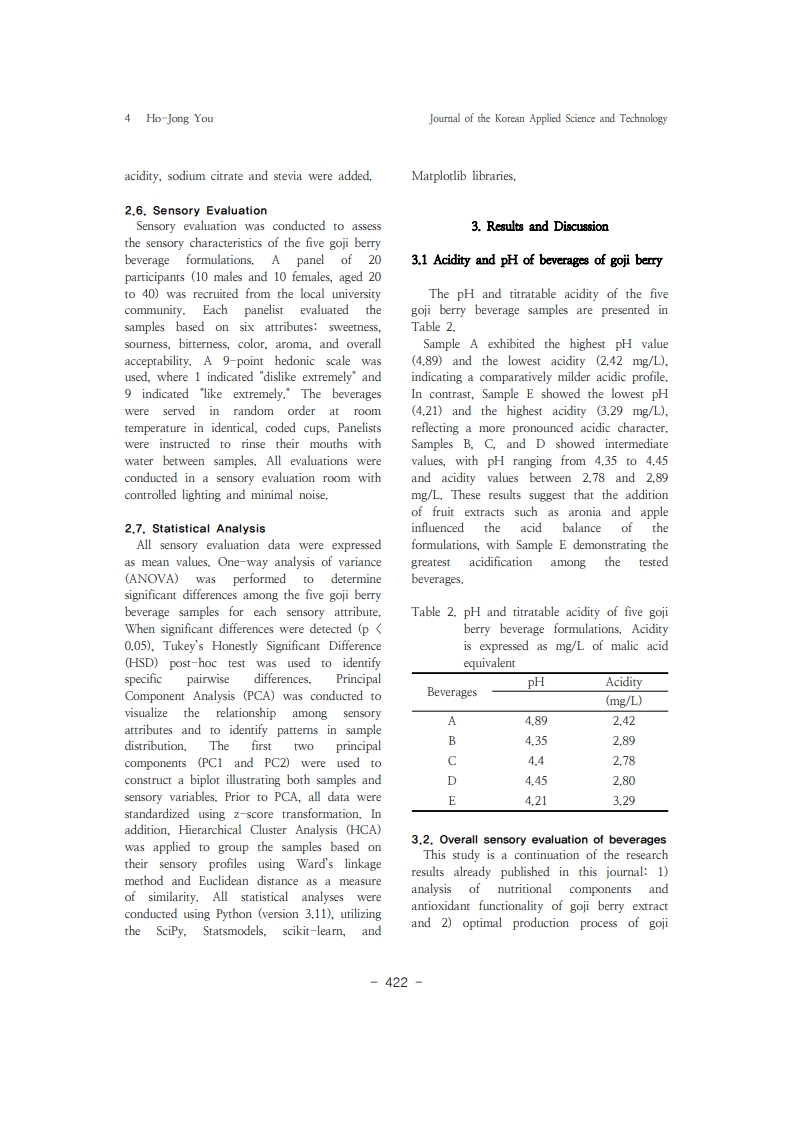
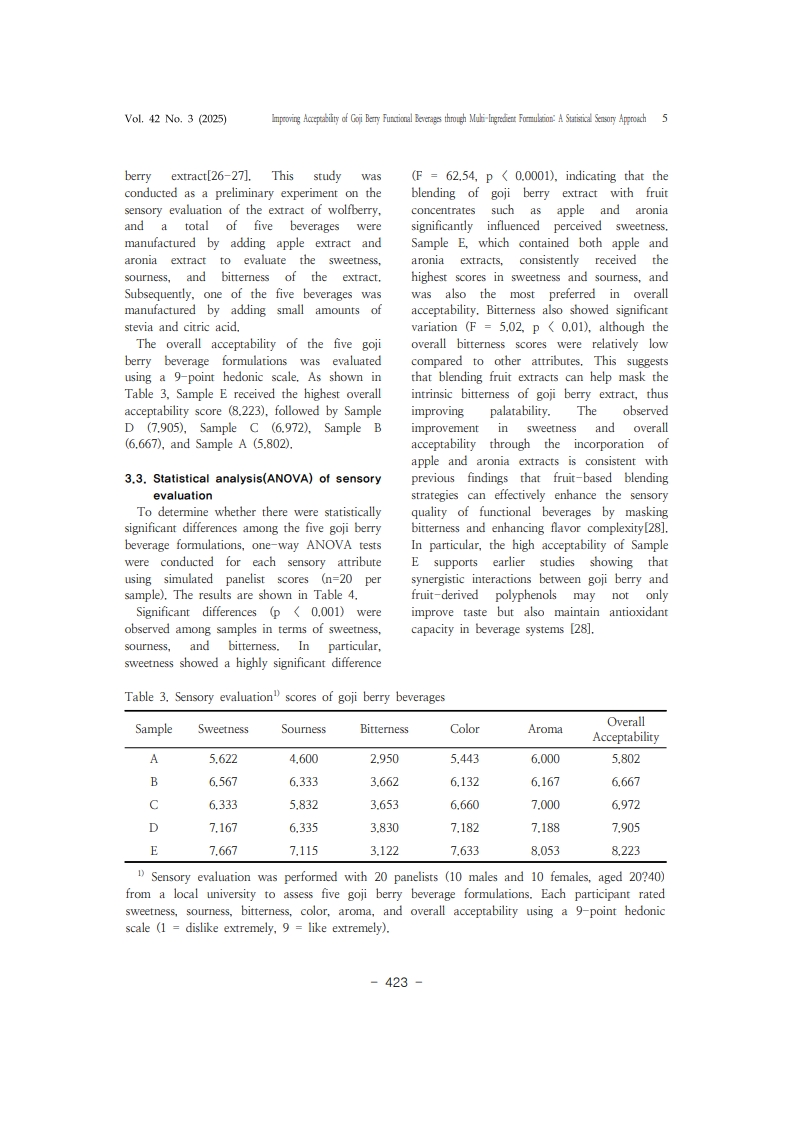
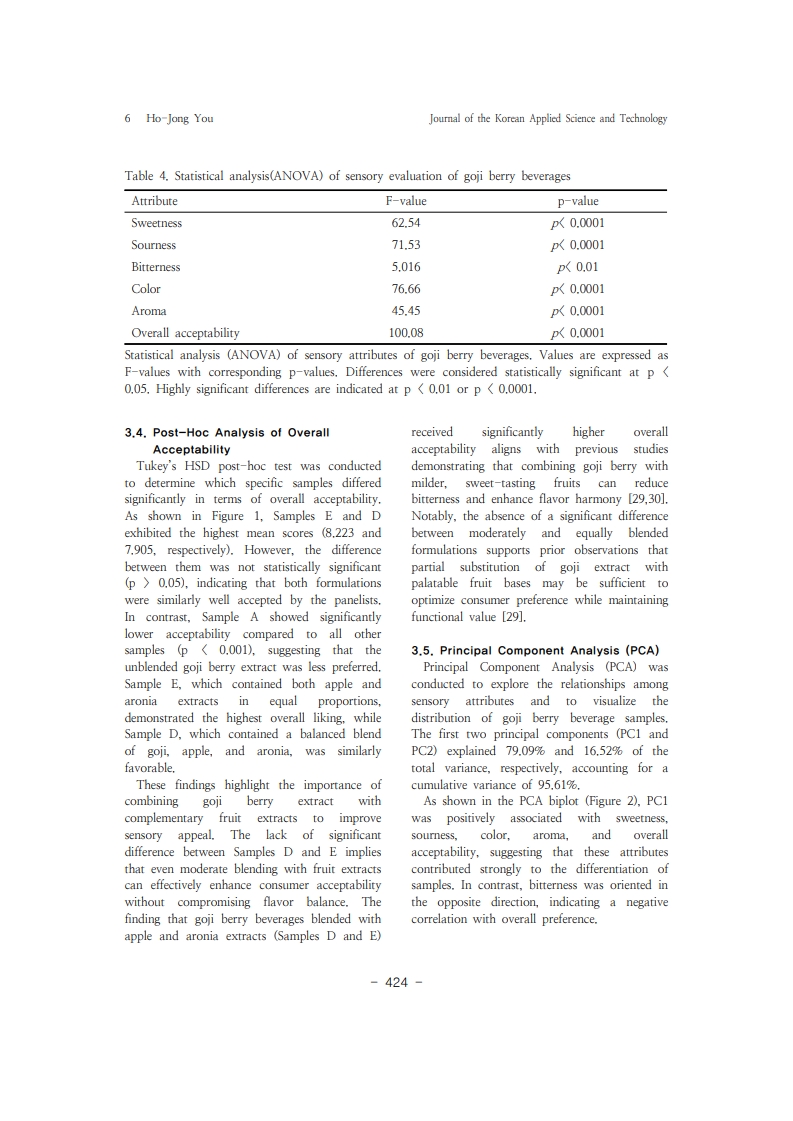
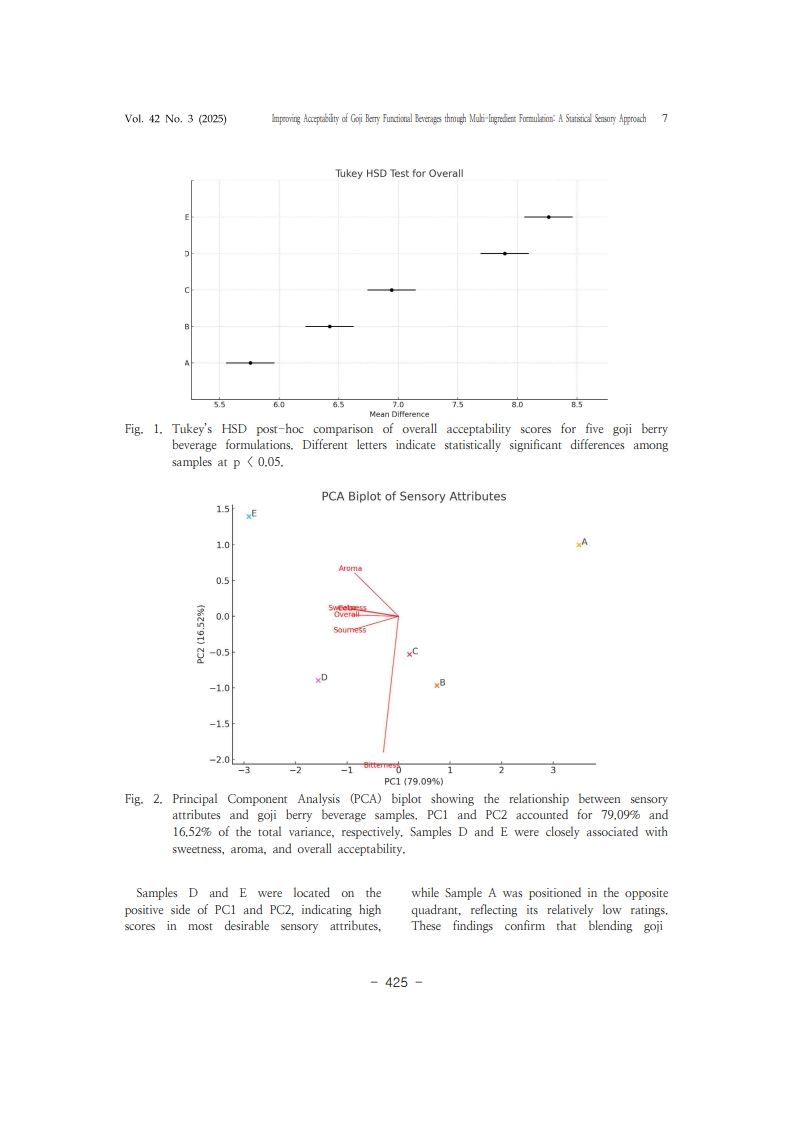
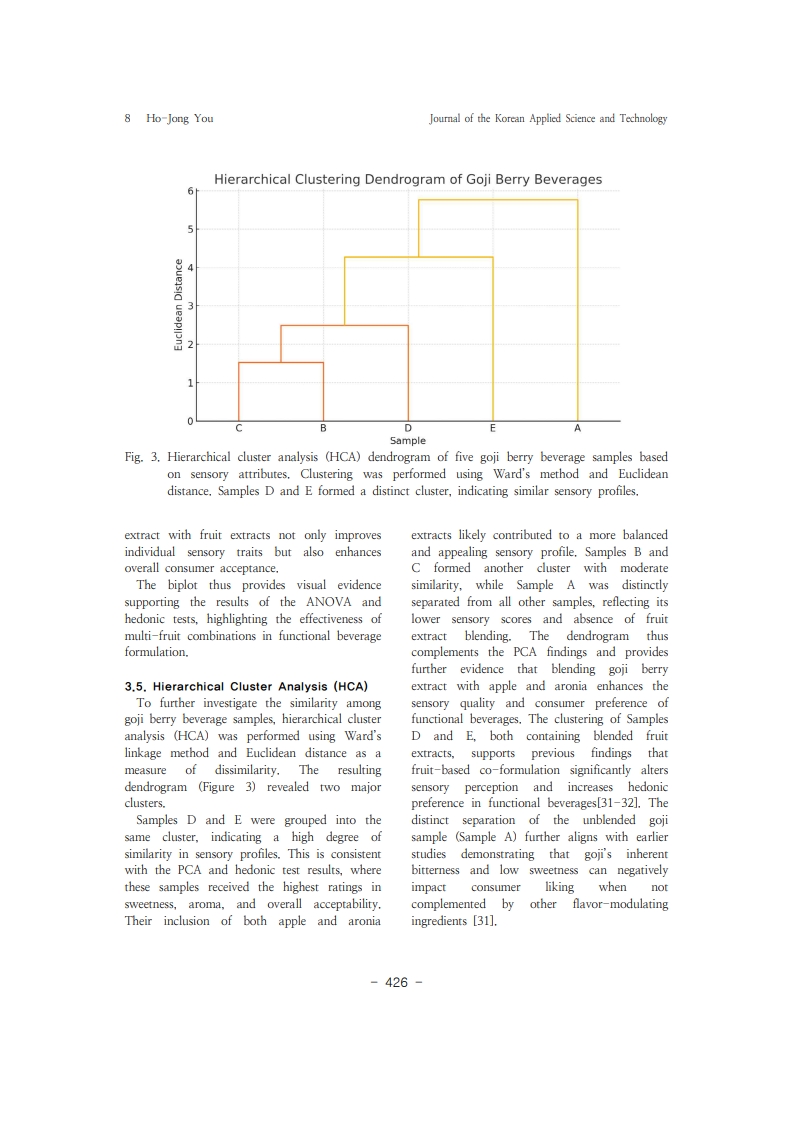
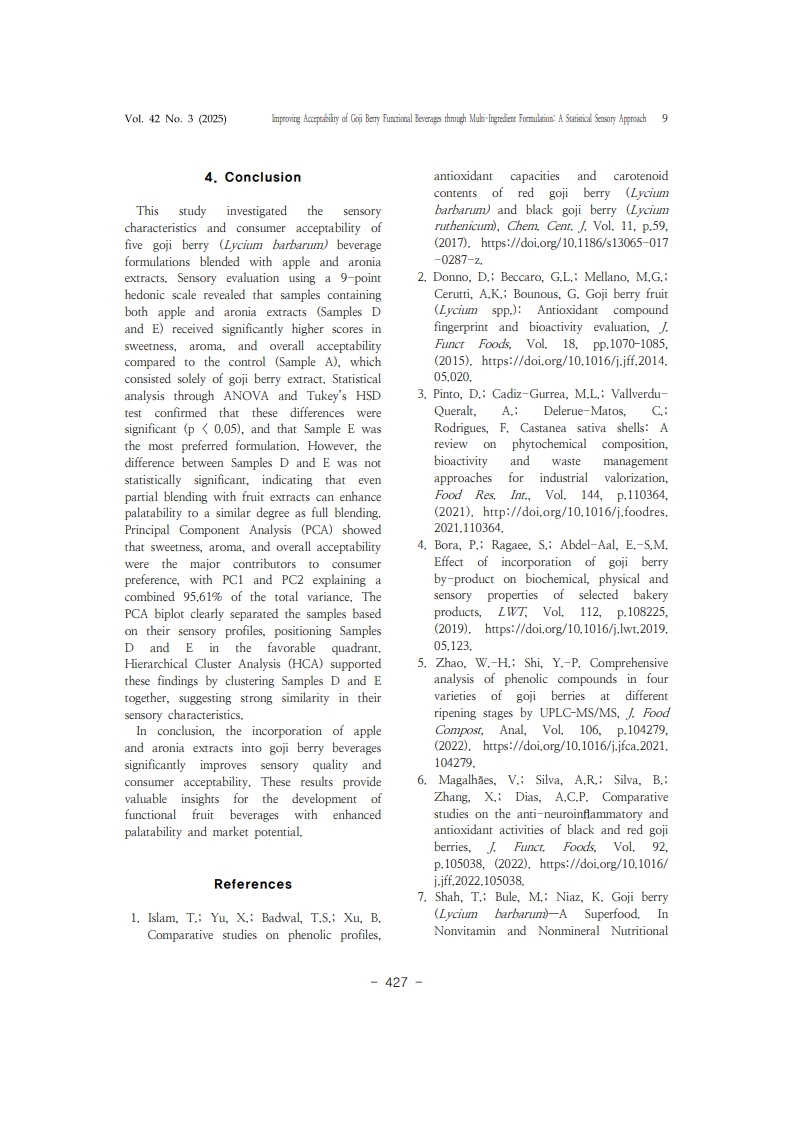
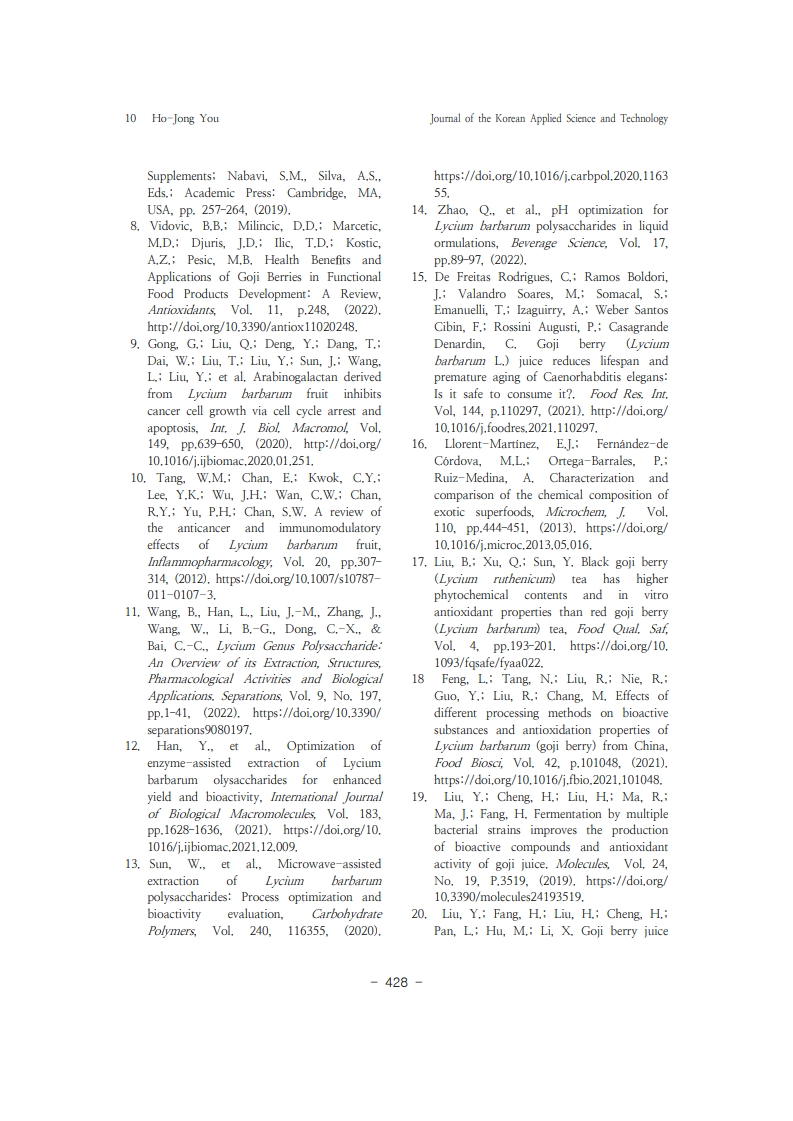
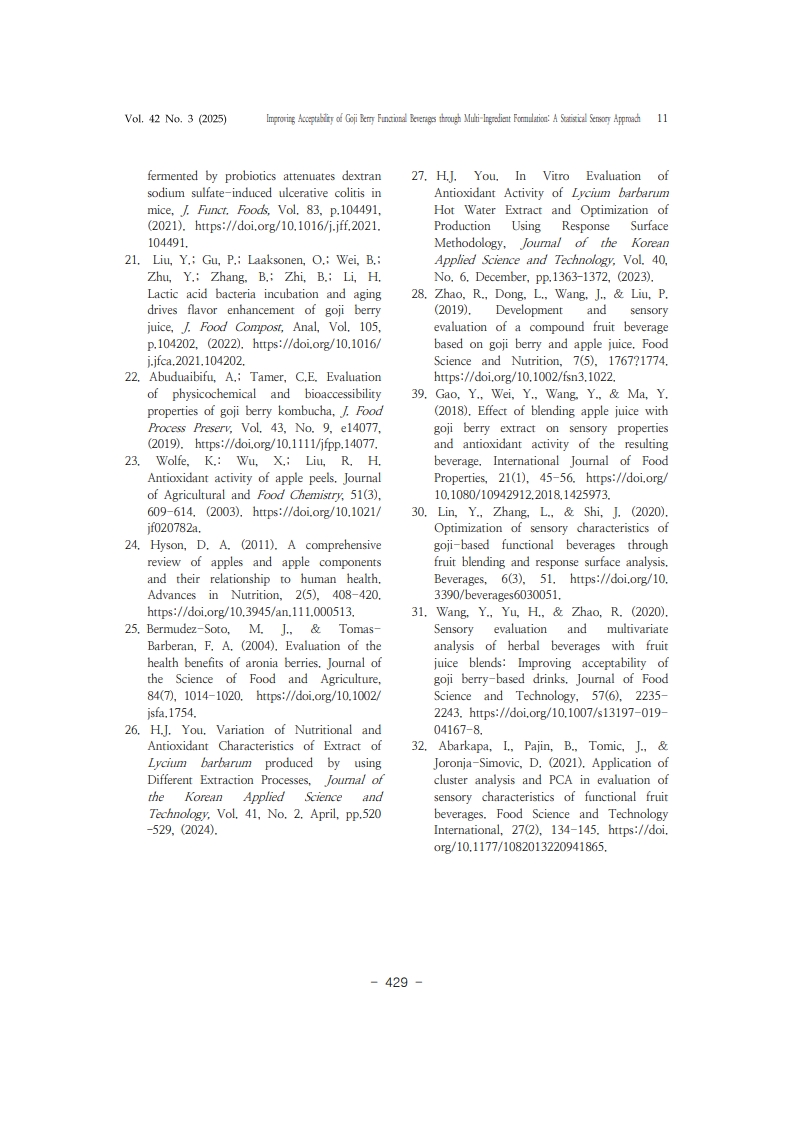
1. Islam, T.; Yu, X.; Badwal, T.S.; Xu, B. Comparative studies on phenolic profiles,antioxidant capacities and carotenoid contents of red goji berry (Lycium
barbarum) and black goji berry (Lycium ruthenicum), Chem. Cent. J. Vol. 11, p.59,(2017). https://doi.org/10.1186/s13065-017-0287-z.
2. Donno, D.; Beccaro, G.L.; Mellano, M.G.; Cerutti, A.K.; Bounous, G. Goji berry fruit (Lycium spp.): Antioxidant compound fingerprint and bioactivity evaluation, J. Funct Foods, Vol. 18, pp.1070–1085,(2015). https://doi.org/10.1016/j.jff.2014.05.020.
3. Pinto, D.; Cadiz-Gurrea, M.L.; VallverduQueralt,A.; Delerue-Matos, C.;Rodrigues, F. Castanea sativa shells: A review on phytochemical composition,
bioactivity and waste management approaches for industrial valorization,Food Res. Int., Vol. 144, p.110364, (2021).
http://doi.org/10.1016/j.foodres.2021.110364.
4. Bora, P.; Ragaee, S.; Abdel-Aal, E.-S.M. Effect of incorporation of goji berryby-product on biochemical, physical and sensory properties of selected bakery
products, LWT, Vol. 112, p.108225, (2019).https://doi.org/10.1016/j.lwt.2019.05.123.
5. Zhao, W.-H.; Shi, Y.-P. Comprehensive analysis of phenolic compounds in fourvarieties of goji berries at different ripening stages by UPLC–MS/MS, J. Food
Compost, Anal, Vol. 106, p.104279, (2022).https://doi.org/10.1016/j.jfca.2021.104279.
6. Magalhães, V.; Silva, A.R.; Silva, B.; Zhang, X.; Dias, A.C.P. Comparativestudies on the anti-neuroinflammatory and antioxidant activities of black and red goji berries, J. Funct. Foods, Vol. 92, p.105038, (2022).https://doi.org/10.1016/j.jff.2022.105038.
7. Shah, T.; Bule, M.; Niaz, K. Goji berry (Lycium barbarum)—A Superfood. InNonvitamin and Nonmineral Nutritional Supplements; Nabavi, S.M., Silva, A.S.,
Eds.; Academic Press: Cambridge, MA, USA, pp. 257–264, (2019).
8. Vidovic, B.B.; Milincic, D.D.; Marcetic, M.D.; Djuris, J.D.; Ilic, T.D.; KosticA.Z.; Pesic, M.B. Health Benefits and Applications of Goji Berries in Functional
Food Products Development: A Review, Antioxidants, Vol. 11, p.248, (2022).http://doi.org/10.3390/antiox11020248.
9. Gong, G.; Liu, Q.; Deng, Y.; Dang, T.; Dai, W.; Liu, T.; Liu, Y.; Sun, J.; Wang,L.; Liu, Y.; et al. Arabinogalactan derived from Lycium barbarum fruit inhibits cancer cell growth via cell cycle arrest and apoptosis, Int. J. Biol. Macromol, Vol.149, pp.639–650, (2020). http://doi.org/10.1016/j.ijbiomac.2020.01.251.
10. Tang, W.M.; Chan, E.; Kwok, C.Y.; Lee, Y.K.; Wu, J.H.; Wan, C.W.; ChanR.Y.; Yu, P.H.; Chan, S.W. A review of the anticancer and immunomodulatory
effects of Lycium barbarum fruit, Inflammopharmacology, Vol. 20, pp.307– 314, (2012). https://doi.org/10.1007/s10787-011-0107-3.
11. Wang, B., Han, L., Liu, J.-M., Zhang, J., Wang, W., Li, B.-G., Dong, C.-X., &Bai, C.-C., Lycium Genus Polysaccharide: An Overview of its Extraction, Structures,
Pharmacological Activities and Biological Applications. Separations, Vol. 9, No. 197,pp.1–41, (2022). https://doi.org/10.3390/separations9080197.
12. Han, Y., et al., Optimization of enzyme-assisted extraction of Lyciumbarbarum olysaccharides for enhanced yield and bioactivity, International Journal
of Biological Macromolecules, Vol. 183, pp.1628–1636, (2021).https://doi.org/10.1016/j.ijbiomac.2021.12.009.
13. Sun, W., et al., Microwave-assisted extraction of Lycium barbarumpolysaccharides: Process optimization and bioactivity evaluation, Carbohydrate
Polymers, Vol. 240, 116355, (2020).https://doi.org/10.1016/j.carbpol.2020.116355.
14. Zhao, Q., et al., pH optimization for Lycium barbarum polysaccharides in liquidormulations, Beverage Science, Vol. 17, pp.89–97, (2022).
15. De Freitas Rodrigues, C.; Ramos Boldori, J.; Valandro Soares, M.; Somacal, S.;Emanuelli, T.; Izaguirry, A.; Weber Santos Cibin, F.; Rossini Augusti, P.; Casagrande Denardin, C. Goji berry (Lycium barbarum L.) juice reduces lifespan and premature aging of Caenorhabditis elegans: Is it safe to consume it?. Food Res. Int.Vol, 144, p.110297, (2021).http://doi.org/10.1016/j.foodres.2021.110297.
16. Llorent-Martínez, E.J.; Fernández-de Córdova, M.L.; Ortega-Barrales, P.;Ruiz-Medina, A. Characterization and comparison of the chemical composition of exotic superfoods, Microchem, J. Vol. 110, pp.444–451, (2013).https://doi.org/10.1016/j.microc.2013.05.016.
17. Liu, B.; Xu, Q.; Sun, Y. Black goji berry (Lycium ruthenicum) tea has higherphytochemical contents and in vitro antioxidant properties than red goji berry
(Lycium barbarum) tea, Food Qual. Saf,Vol. 4, pp.193–201.https://doi.org/10.1093/fqsafe/fyaa022.
18 Feng, L.; Tang, N.; Liu, R.; Nie, R.; Guo, Y.; Liu, R.; Chang, M. Effects ofdifferent processing methods on bioactive substances and antioxidation properties of Lycium barbarum (goji berry) from China, Food Biosci, Vol. 42, p.101048, (2021).https://doi.org/10.1016/j.fbio.2021.101048.
19. Liu, Y.; Cheng, H.; Liu, H.; Ma, R.; Ma, J.; Fang, H. Fermentation by multiplebacterial strains improves the production of bioactive compounds and antioxidant
activity of goji juice. Molecules, Vol. 24, No. 19, P.3519, (2019).https://doi.org/10.3390/molecules24193519.
20. Liu, Y.; Fang, H.; Liu, H.; Cheng, H.; Pan, L.; Hu, M.; Li, X. Goji berry juicefermented by probiotics attenuates dextran sodium sulfate-induced ulcerative colitis in mice, J. Funct. Foods, Vol. 83, p.104491, (2021).https://doi.org/10.1016/j.jff.2021.104491.
21. Liu, Y.; Gu, P.; Laaksonen, O.; Wei, B.; Zhu, Y.; Zhang, B.; Zhi, B.; Li, H.Lactic acid bacteria incubation and aging
drives flavor enhancement of goji berry juice, J. Food Compost, Anal, Vol. 105,p.104202, (2022). https://doi.org/10.1016/j.jfca.2021.104202.
22. Abuduaibifu, A.; Tamer, C.E. Evaluation of physicochemical and bioaccessibilityproperties of goji berry kombucha, J. Food Process Preserv, Vol. 43, No. 9, e14077,
(2019). https://doi.org/10.1111/jfpp.14077.
23. Wolfe, K.: Wu, X.; Liu, R. H. Antioxidant activity of apple peels. Journalof Agricultural and Food Chemistry, 51(3), 609-614. (2003).
https://doi.org/10.1021/jf020782a.
24. Hyson, D. A. (2011). A comprehensive review of apples and apple componentsand their relationship to human health. Advances in Nutrition, 2(5), 408-420.
https://doi.org/10.3945/an.111.000513.
25. Bermudez-Soto, M. J., & TomasBarberan,F. A. (2004). Evaluation of thehealth benefits of aronia berries. Journal of the Science of Food and Agriculture,
84(7), 1014-1020. https://doi.org/10.1002/jsfa.1754.
26. H.J. You. Variation of Nutritional and Antioxidant Characteristics of Extract ofLycium barbarum produced by using Different Extraction Processes,
27. H.J. You. In Vitro Evaluation of Antioxidant Activity of Lycium barbarumHot Water Extract and Optimization of Production Using Response Surface
Methodology, Journal of the Korean Applied Science and Technology, Vol. 40,No. 6. December, pp.1363–1372, (2023).
28. Zhao, R., Dong, L., Wang, J., & Liu, P. (2019). Development and sensoryevaluation of a compound fruit beverage based on goji berry and apple juice. Food
Science and Nutrition, 7(5), 1767?1774.https://doi.org/10.1002/fsn3.1022.
29. Gao, Y., Wei, Y., Wang, Y., & Ma, Y. (2018). Effect of blending apple juice withgoji berry extract on sensory properties and antioxidant activity of the resulting
beverage. International Journal of Food Properties, 21(1), 45-56.https://doi.org/10.1080/10942912.2018.1425973.
30. Lin, Y., Zhang, L., & Shi, J. (2020). Optimization of sensory characteristics ofgoji-based functional beverages through fruit blending and response surface analysis.Beverages, 6(3), 51. https://doi.org/10.3390/beverages6030051.
31. Wang, Y., Yu, H., & Zhao, R. (2020). Sensory evaluation and multivariateanalysis of herbal beverages with fruit juice blends: Improving acceptability of
goji berry-based drinks. Journal of Food Science and Technology, 57(6), 2235-2243. https://doi.org/10.1007/s13197-019-04167-8.
32. Abarkapa, I., Pajin, B., Tomic, J., & Joronja-Simovic, D. (2021). Application ofcluster analysis and PCA in evaluation of sensory characteristics of functional fruit
beverages. Food Science and Technology International, 27(2), 134-145.https://doi.org/10.1177/1082013220941865.
